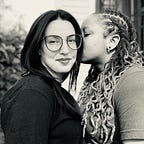My great-great aunt was a Nazi
and I will treat my uncle like my grandfather treated her.
My grandfather worked for banks in Manhattan in the Mad Men era. This was never easier for me to imagine than when I listened to him tell stories. You could almost see the dirty vodka martini in his hand. All charm and mischief, his eyes gave away that there was something juicy coming. His big Brooklyn voice rising and falling, modulating to impersonate his characters and often his own conscience, he held the room with ease. Once he had us, his expertise really began to show — a clear image here, a perfectly placed aside there, and flourished gestures as garnish.
As we both got older, I spent much of our limited time together asking him questions and listening to his stories. He knew I loved stories and he loved me, so he’d tell ones he knew I’d like as he shot me a conspiratorial wink across the room. When his dementia began to progress, his stories started to slide backwards through time. It began when he started telling stories about my mother and her siblings when they were kids more often, but would sometimes forget a detail we knew he had known. In the last years of his life, his stories centered more and more around his child and young adulthood. I tried to surreptitiously capture as much as I could through furiously typed notes and voice memos. More often, though, I tried to be in the moment with him — to watch his joy, feel his laugh, and learn the lesson his story was meant to teach me.
It was during this twilight on a long Pennsylvania drive with my mother and I, that he told a striking story neither of us had heard before. He and I were chattering about politics as we were wont to do (he once mailed me an Obama mailer he “knew I would appreciate as much as [he did]”). He looked out the window and said, “you know…” in that way that told me to settle in.
As my mother and I listened, he told us one of his precious and bittersweet stories from his childhood in Brooklyn in the 1930s and 40s. World War II began when he was three and ended when he was nine-years-old.
He began the story with flashes of childlike memories — collecting bottle caps, dark nights during the dim outs, rationed sugar — all told in the nebulous way children understand things, emotions, not facts. Scene set, he changed tempo and said, “You know, my aunt was a Nazi.”
My mother and I looked at each other incredulously (his intended effect). “It’s true,” he said shaking his head.
Our genealogy is of the Heinz 57 variety of whites. With a strong line of Irish Catholic mothers on my mother’s side, Ireland was the only country I had ever felt any connection to. I knew vaguely that my Pop’s side had some German lineage, but I had never heard anything of substance about it until that car ride.
Maybe there was an explanation of her sympathies for the Third Reich and maybe he talked about how she read pro-Nazi newspapers. What I remember clearly is how resolutely and proudly he told us that his entire family stopped speaking to her. He was clear that it had been the right thing to do.
Despite his stubbornness and work in the financial industry, my pop changed parties sometime between being an accountant in the city, moving his family out to Jersey, and retiring in a small community in the Pocono Mountains. A libra, like almost all the men in my family, my grandfather was fair-minded and thought racism was small and pathetic. Unafraid to voice his opinion no matter who he was around, I can remember a heated argument between him and my 5th grade social studies teacher on Grandparent’s Day, but the person I remember him arguing with most often was the son who shared his name.
Despite his teenage years in all black Ramones t-shirts, my uncle grew up to be a Republican voting government employee who eventually became a self-proclaimed Libertarian despite benefitting to this day from social security programs. Like my grandfather before me, I have tried to argue with him over the years, but I am not as stubborn as my pop. I blocked him on social media platforms and went about my life long ago. When I got married this summer, he sent my wife a friend request and passive-aggressive facebook message insisting that no matter what she’d heard he really was a good guy, “so long as you don’t try to take away my rights.”
During the failed coup on January 6th, my wife showed me these posts from his personal facebook page:
It is abundantly clear to me what to do with people like my uncle, thanks in part to my Pop’s story about his aunt. There is no reasoning with or being civil with Nazis or other intolerant people. The paradox of tolerance teaches us that unlimited tolerance will lead us to being destroyed by the intolerant. As my Pop’s daughter says, “when you lie with dogs, you get fleas.” Similarly, if you hang out with Nazis, you’re a Nazi — and Nazis, confederates, Trump supporters, and the like should feel the deep isolation of being rejected by society and living out their lives bitter and alone. To enable them by doing anything else has a body count.
As Pop always said, “there’s no two ways about it.”
